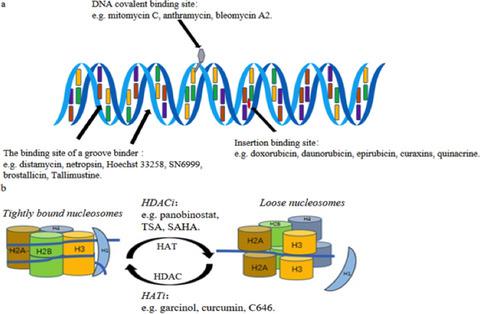当前位置:
X-MOL 学术
›
Cell Prolif.
›
论文详情
Our official English website, www.x-mol.net, welcomes your
feedback! (Note: you will need to create a separate account there.)
Chromatin‐modifying drugs and metabolites in cell fate control
Cell Proliferation ( IF 5.9 ) Pub Date : 2020-09-26 , DOI: 10.1111/cpr.12898 Ziyue Yao 1, 2, 3 , Yu Chen 1, 2, 3 , Wenhua Cao 1, 2, 3 , Ng Shyh-Chang 1, 2, 3
Cell Proliferation ( IF 5.9 ) Pub Date : 2020-09-26 , DOI: 10.1111/cpr.12898 Ziyue Yao 1, 2, 3 , Yu Chen 1, 2, 3 , Wenhua Cao 1, 2, 3 , Ng Shyh-Chang 1, 2, 3
Affiliation

|
For multicellular organisms, it is essential to produce a variety of specialized cells to perform a dazzling panoply of functions. Chromatin plays a vital role in determining cellular identities, and it dynamically regulates gene expression in response to changing nutrient metabolism and environmental conditions. Intermediates produced by cellular metabolic pathways are used as cofactors or substrates for chromatin modification. Drug analogues of metabolites that regulate chromatin‐modifying enzyme reactions can also regulate cell fate by adjusting chromatin organization. In recent years, there have been many studies about how chromatin‐modifying drug molecules or metabolites can interact with chromatin to regulate cell fate. In this review, we systematically discuss how DNA and histone‐modifying molecules alter cell fate by regulating chromatin conformation and propose a mechanistic model that explains the process of cell fate transitions in a concise and qualitative manner.
中文翻译:

细胞命运控制中的染色质修饰药物和代谢物
对于多细胞生物体来说,产生各种特化细胞来执行一系列令人眼花缭乱的功能至关重要。染色质在确定细胞身份方面发挥着至关重要的作用,它动态调节基因表达以响应不断变化的营养代谢和环境条件。细胞代谢途径产生的中间体用作染色质修饰的辅因子或底物。调节染色质修饰酶反应的代谢物的药物类似物也可以通过调整染色质组织来调节细胞命运。近年来,有很多关于染色质修饰药物分子或代谢物如何与染色质相互作用来调节细胞命运的研究。在这篇综述中,我们系统地讨论了DNA和组蛋白修饰分子如何通过调节染色质构象来改变细胞命运,并提出了一个机制模型,以简洁和定性的方式解释细胞命运转变的过程。
更新日期:2020-09-26
中文翻译:

细胞命运控制中的染色质修饰药物和代谢物
对于多细胞生物体来说,产生各种特化细胞来执行一系列令人眼花缭乱的功能至关重要。染色质在确定细胞身份方面发挥着至关重要的作用,它动态调节基因表达以响应不断变化的营养代谢和环境条件。细胞代谢途径产生的中间体用作染色质修饰的辅因子或底物。调节染色质修饰酶反应的代谢物的药物类似物也可以通过调整染色质组织来调节细胞命运。近年来,有很多关于染色质修饰药物分子或代谢物如何与染色质相互作用来调节细胞命运的研究。在这篇综述中,我们系统地讨论了DNA和组蛋白修饰分子如何通过调节染色质构象来改变细胞命运,并提出了一个机制模型,以简洁和定性的方式解释细胞命运转变的过程。











































 京公网安备 11010802027423号
京公网安备 11010802027423号